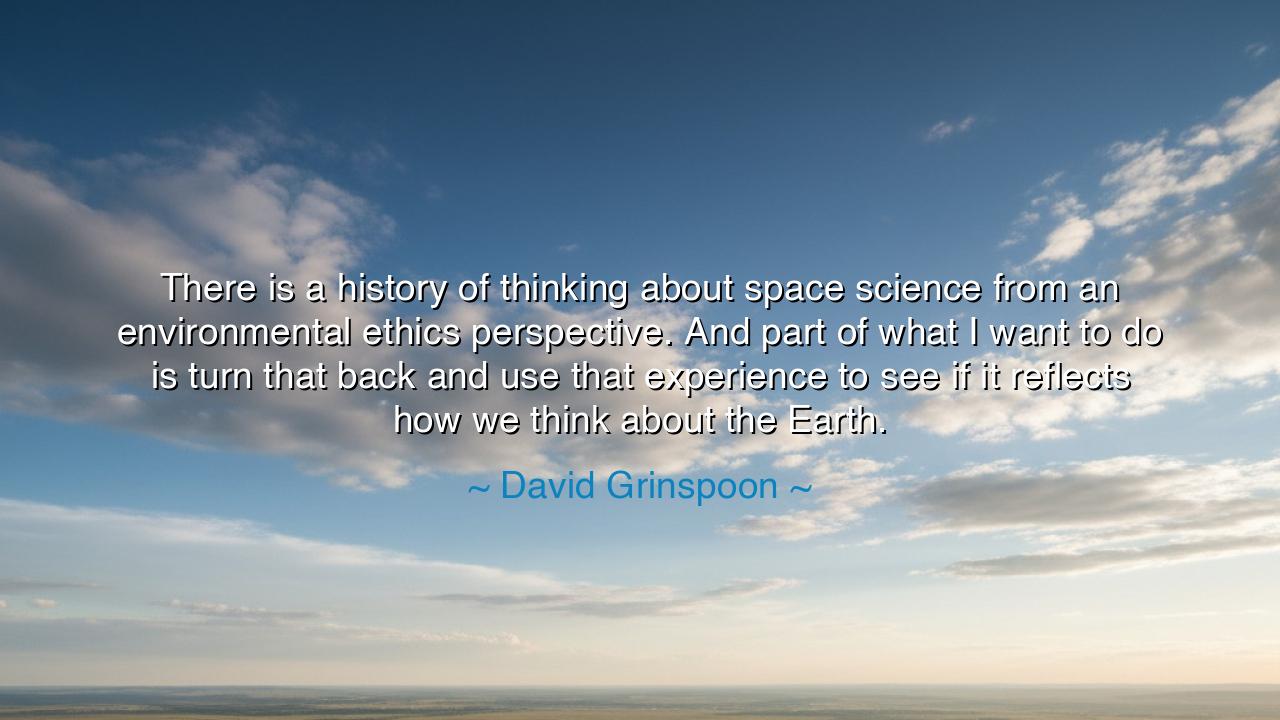
There is a history of thinking about space science from an
There is a history of thinking about space science from an environmental ethics perspective. And part of what I want to do is turn that back and use that experience to see if it reflects how we think about the Earth.






The words of David Grinspoon, scientist and philosopher of the heavens, shine with a wisdom that binds together earth and sky: “There is a history of thinking about space science from an environmental ethics perspective. And part of what I want to do is turn that back and use that experience to see if it reflects how we think about the Earth.” In this reflection, he calls us to look beyond our world, to see how our dreams of the cosmos can teach us how to care for the fragile planet beneath our feet. It is a summons to humility—that even as we reach toward the stars, we must not forget the soil that cradles us.
At the heart of his words is the principle of environmental ethics. When humans first dreamed of sending ships beyond the Earth, they asked: How shall we act toward other worlds? Should we protect the untouched surfaces of Mars or Europa? Should we contaminate no soil, disturb no ecosystem, even if alien life is but a possibility? This caution, born of reverence, created a new branch of thought: the ethics of planetary protection. Grinspoon’s wisdom is to turn this back upon ourselves—to ask why we are so careful about worlds we have never touched, and yet so careless with the world that sustains us daily.
History itself bears witness to this irony. In the 20th century, as astronauts gazed upon Earth from the void, they saw the “pale blue dot,” fragile and whole. That single vision awakened movements of environmental stewardship more powerful than any before. The first Earth Day followed soon after humanity’s first ventures to the Moon. What the ancients could not have imagined, the astronauts testified: the Earth is not an endless expanse but a small, vulnerable sphere in the vastness. Thus, space science became not only a path to exploration but also a mirror, showing us the urgency of protecting our home.
Grinspoon’s words remind us of the paradox: we treat distant worlds with greater reverence than our own. We design sterilized probes so as not to pollute Mars, while allowing rivers on Earth to carry toxins into the seas. We dream of terraforming Venus, while dismantling the delicate balance of our climate here. His call is not condemnation, but awakening: if we can summon care for planets yet unvisited, surely we can summon greater care for the one that gave us birth.
This reflection carries within it a heroic challenge. The ethic of stewardship must not end at Earth’s edge, nor begin only in the silence of space. It must be practiced in the air we breathe, the forests we cut, the oceans we stir. To look upward to the stars should deepen, not diminish, our responsibility to the Earth. For the heavens remind us of our fragility, and fragility calls us to reverence.
The lesson is plain: let us learn from our caution in space and bring it home to Earth. If we can weigh every action on Mars for fear of disturbing what might be, let us weigh our actions here for fear of destroying what already is. If we can imagine the dignity of life elsewhere, let us defend the dignity of life here. Ethics, like gravity, must not be suspended in the void, but must anchor us to the truth of our interdependence.
Therefore, children of tomorrow, take David Grinspoon’s wisdom into your hearts. Look to the stars, but return your gaze to the soil. Let the reverence we hold for distant worlds remind us to cherish the rivers, the trees, and the air that surround us. For the Earth is not merely another planet—it is the cradle of life, the sacred vessel of our beginnings. To honor it is the highest act of wisdom, and to preserve it is the noblest legacy we can leave for those yet unborn.






AAdministratorAdministrator
Welcome, honored guests. Please leave a comment, we will respond soon